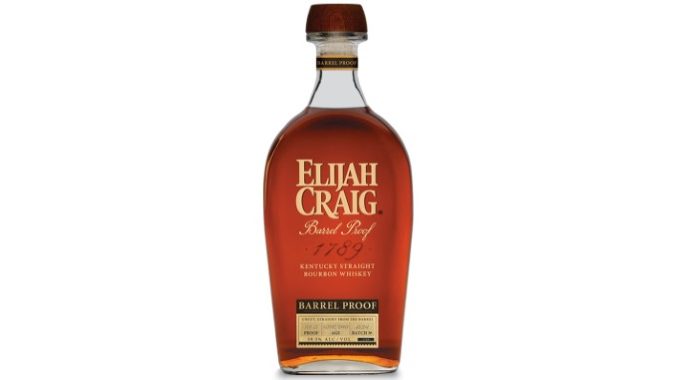Elijah Craig Barrel Proof Bourbon (Batch A124) Review
Photos via Heaven Hill
From the moment that Heaven Hill announced that it would be dropping the concrete, 12-year age statement from its beloved Elijah Craig Barrel Proof Bourbon in favor of a moving series of ages that could be lower or higher than 12 years, whiskey geek speculation has had every invitation to run wild with panic and rumor. Born pessimists, there was no way that even a company like Heaven Hill was going to get the benefit of the doubt here–it’s only natural that whiskey geeks will assume that this is the first step in the gradual decline of one of their favorite brands. The first two releases of this era, B523 and C923, illustrated what this variation could result in, from a perfectly average ECBP batch aged 11 years, 5 months, to a truly exceptional one–one of my best whiskeys of 2023, in fact–that was aged 13 years, 7 months. That would seemingly show a clear correlation, but Heaven Hill’s own Old Fitzgerald series has illustrated quite nicely that age is just a number, and that sometimes younger batches outshine the older ones. Still, despite that, it feels like the new Elijah Craig Barrel Proof A124 is likely to be the moment when many whiskey geeks really start getting cynical about this series, whether or not that is deserved.
We knew, once these age statements became variable, that it would most likely be a pretext to making the majority of batches younger than the previous 12 year age statement. Presumably, as long as an extra-aged variant such as C923 is thrown out every now and then, drinkers will tolerate however many 11 year old batches. But what about 10 year old batches? What about ones even younger than that? The fears here amount to a classic slippery slope argument, and this release of Elijah Craig Barrel Proof A124 is likely to stoke those fears.
The age statement here of course jumps out first: 10 years, 9 months. That’s nearly 3 years younger than the last release, C923. Then there’s the relatively low strength for the series as well, at 59.5% ABV (119 proof). I’ve already seen some angry claims from whiskey geeks online saying that this is the “weakest batch” of ECBP ever, though that’s not quite true–Batch B521 was only 118.2 proof, which means that this would be the second weakest since releases began in 2013. But it does continue the general trend line of proof decline that has happened in the ECBP series since 2020, when the series began regularly hovering in the 120s rather than the common 130s (and even a sole 140 proofer) of the past.
This is likely to be compounding in the minds of some whiskey geeks by the simple fact that ECBP has a single MSRP for every batch, which remains currently at $75. Now, in the modern whiskey world that is objectively a good value for a cask strength, extra aged bourbon from pretty much every producer. But when you have one release that is 13+ years old, at 130+ proof, and the next one is 10 years, 119 proof–while they both carry the same MSRP–it’s pretty much impossible for the consumer to not see the latter as a reduction in value. We’re human beings; we don’t like to see numbers go down. Perhaps if the gaps between the oldest and youngest ECBP batches continues to grow, Heaven Hill will have to introduce a variable pricing point like they do in the dramatic age changes between each Old Fitzgerald batch.
The point, overall, is this: This is going to be a very, very difficult batch of ECBP for whiskey fans, and even whiskey critics, to rate objectively, because of the underlying fear that it represents. Drinkers are scared that 10 year batches will become the norm, and then 9 years, and then 8, and so forth. In its current state, there’s absolutely no doubt that a 10 year, 9 month, 119 proof bottle of Kentucky bourbon is still likely to be an extra-aged flavor bomb, but we are operating with a lot of shades of gray, not knowing what the future of this series will look like. Only the folks at Heaven Hill (maybe) know for sure. We can only try to give each release as objective an assessment as we possibly can.
-

-

-

-

-

-

-

-

-

-

-

-

-

-

-

-

-

-

-

-

-

-

-

-

-

-

-

-

-

-

-

-

-

-

-

-

-

-

-

-








































